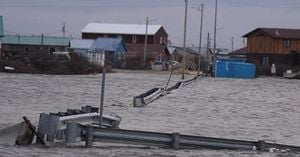On August 29, 2025, a chorus of voices from Washington, D.C., rang out in defiance against what they described as an unprecedented federal incursion into local governance. Ninety-three Advisory Neighborhood Commissioners—hyperlocal, nonpartisan, and unpaid elected officials representing every corner of the nation’s capital—joined forces with civil society leaders to denounce President Donald Trump’s takeover of the Metropolitan Police Department and the deployment of 800 National Guard troops across city streets. Their message was clear: this is not about public safety, but about the very future of local democracy in America.
According to a joint letter published by the commissioners and reported by The Washington Post, the federal intervention is nothing less than a “direct attack on the freedom and independence every community deserves.” The commissioners, who know their neighborhoods intimately—leading meetings, reviewing zoning applications, and advocating for local improvements—argued that Trump’s actions strip Washingtonians of the right to self-govern. “The takeover strips us of independence in budgeting, policymaking, and public safety—rights that every American in the 50 states takes for granted,” the letter stated.
The president’s emergency declaration, which allowed him to seize control of the D.C. police force, has also redirected 120 FBI agents from their usual duties—counterterrorism, cybercrime, and public corruption—to patrol tourist hotspots like Georgetown and the National Mall. As reported by Nexstar Media, this move comes despite the fact that violent crime in D.C. reached a historic 30-year low in 2024 and has dropped another 26 percent so far in 2025. These statistics, the commissioners and advocates argue, undermine any claim of a genuine crisis warranting federal intervention.
Support for the president’s actions has also come from beyond the Beltway. Republican governors from Tennessee, Louisiana, Mississippi, Ohio, West Virginia, and South Carolina have pledged to send their states’ National Guard troops to Washington. Critics, including the Not Above the Law Coalition, warn that these governors are prioritizing Trump’s power play over the needs and wishes of their own constituents. “They’re more focused on Trump’s authoritarian power grab than the needs of their own state or respecting the Constitution,” wrote the coalition’s co-chairs in their opinion piece.
The commissioners emphasized that the National Guard is ill-equipped for day-to-day law enforcement. “Their mission is not community policing, de-escalation, or building trust,” they wrote. Community leaders have already begun to report that residents are now hesitant to call 911, unsure whether they’ll encounter a familiar local officer or a federal agent who might see them as a threat. This climate of fear, they argue, risks undoing a decade of progress in community policing and could actually make the city less safe.
There’s also a significant economic cost. The deployment of the National Guard carries a taxpayer price tag in the tens of millions of dollars—money that, the commissioners argue, would be better spent on smarter policing, violence interruption programs, and wrap-around social services. Earlier this year, the U.S. House barred D.C. from spending $1.1 billion of its own local tax funding, delaying critical programs across the city, from public safety initiatives to school improvements and mental health services. The commissioners called on Congress to restore this funding immediately and to fill judicial vacancies in D.C. courts, which have slowed trials and delayed justice for victims.
“It is the height of hypocrisy for federal leaders to block the very resources D.C. needs to govern ourselves effectively and then criticize us for not doing enough,” the commissioners wrote. They accused federal officials of manufacturing challenges only to use them as justification for a takeover. “This is not fiscal oversight, it is an attack on our independence, our freedom to self-govern, and our right to decide how our own tax dollars are spent.”
For many in D.C., the implications of Trump’s actions reach far beyond their city limits. As the Not Above the Law Coalition warned, “If a president can flood your streets with federal agents and import troops from other states under the guise of an ‘emergency,’ then no community is safe.” They argue that the normalization of federalizing local policing and military crackdowns could spread to other American cities, threatening the freedoms of every citizen. “Do we truly want an America in which the president, of either political party, has complete and absolute control over law enforcement and the use of military force in our nation’s capital, or in other cities across our country?” they asked pointedly.
President Trump’s request to Congress for “long-term” control of D.C.’s police, as reported by Nexstar Media, has only heightened fears that this is not a temporary measure, but a blueprint for establishing federal dominance over local governance. The commissioners and their allies see this as a test case—a warning to every mayor, city council, and taxpayer in America. “The president has already deployed the National Guard against local wishes in other jurisdictions,” they noted. “The precedent that allows a president to override local control of policing, budgeting, and governance based on a subjective ‘emergency’ declaration should alarm every mayor, city council, and taxpayer in America.”
Economic concerns have also been raised. Trump’s critics point to his tariffs, which they say have driven up the cost of groceries, household goods, and small business supplies, as well as his administration’s deep cuts to health care. “He is diverting taxpayer-funded National Guard troops and federal law enforcement to stage a spectacle in D.C., while Americans struggle with higher prices caused by his reckless tariffs,” wrote the coalition’s leaders. They also accused the president of using public resources for political theater, rather than addressing the real problems facing families across the country.
Congressional action is being urged on multiple fronts. A resolution introduced by Reps. Jamie Raskin (D-Md.), Robert Garcia (D-Calif.), Del. Eleanor Holmes Norton (D-D.C.), and Sen. Chris Van Hollen (D-Md.) seeks to end Trump’s state of emergency declaration in Washington. But both the commissioners and civil society leaders agree that more is needed. The commissioners called on Congress to reject any extension of federal control in D.C. and to defend the principle of local self-governance. The coalition’s leaders echoed this, insisting that leaders from both parties must condemn the abuse of power and prevent it from becoming entrenched as the new normal.
As the commissioners concluded in their letter, “This is not just a D.C. Beltway fight. It is a fight for every community’s right to chart its own path, protect its independence, and be heard above the din of national politics.” For now, D.C.’s grassroots democracy remains defiant, determined to prove every day that local government works—even as it faces one of its greatest tests in living memory.





